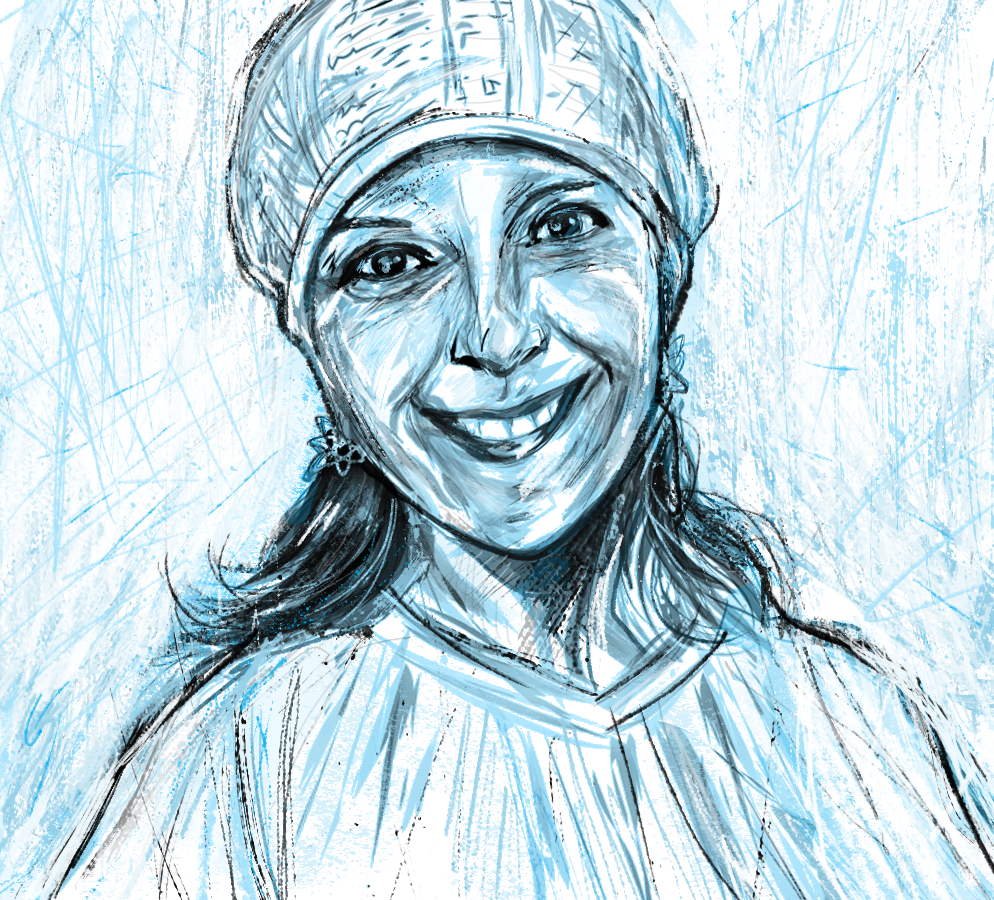
"I Found My Voice While Fighting to Breathe"
In the middle of the night, the attending physician stands at the foot of my bed in a darkened hospital room. Her voice breaks when she speaks.
“It’s not working,” she says to the ICU nurse.
I look over at her and see she’s shaking while staring at the illuminated monitor that shows my vitals. The “it” she’s referring to is the BiPAP machine that they hoped would help me breathe.
“We have one more thing we can try,” the ICU nurse says to me. “A high-flow oxygen machine.”
“Let’s try it,” I say. “How long do we have?”
“10 minutes,” she says. “And if this doesn’t work, I have to take you to the ICU and put you on a ventilator.” Her tone is kind, but not optimistic.
I nod. I’m terrified. I call my ancestors, and they’re there. The ICU nurse connects me to the high-flow machine. We keep our eyes fixed on my monitor to see if my numbers climb. A triumvirate—the attending physician, the ICU nurse, and me—collectively hoping for a miracle. If this were a movie, the music would swell here punctuated by the beeping monitor. I want to do something, to take control of the situation and fix it. But I can’t. There’s nothing I can do in this moment. It’s all up to science now.
The Setup
Over the course of three weeks, I nearly died twice. I’m undergoing treatment for early-stage breast cancer and developed a condition called chemotherapy-induced pulmonary pneumonitis. Taxol, one of the chemotherapy drugs I was given, attacked my lungs, causing near respiratory failure.
Two weeks of troubling symptoms—a rash, a fever, extreme exhaustion, shortness of breath, a relentless hacking cough, and sore throat—were hand-waved by my oncologist as being typical for chemo, but I knew something was terribly wrong. I went for a COVID test, and it came back negative. I asked to come in for blood work. My nurse practitioner and oncologist say it’s not necessary unless I have a fever again.
“This is just how chemo goes,” they say. “Take Robitussin. Try drinking warm milk.”
Something was wrong. Why won’t they listen to me? I get out of my Uber at the cancer center for my sixth chemo infusion and see my friend, Edith, on the sidewalk waiting for me. I walk so slowly it’s as if I’m twice my age. Under her mask, I can tell Edith’s smiling, but I also see the concern in her eyes. I’m in bad shape. She offers her arm, and I take it.
Inside the cancer center, they run my labs and vitals. My oxygen level is 85. It should be in the high 90s. My resting heart rate is over 130 when it should be between 60 and 80.
“We’re calling an ambulance to take you to the ER,” the nurse practitioner says. “I’m afraid you have a blood clot.”
I look over at Edith, and I start to cry with panic and more than a little anger. I told my oncologist and nurse practitioner something was wrong; now they see I was right. Why didn’t they just listen to me? Why didn’t they help me before now?
The EMTs arrive, get me onto a gurney, and shuttle Edith and I three crosstown blocks to the ER. Edith tries to calm me down with funny stories. I smile for her sake. Inside, I’m breaking down.
We get to the ER and they wheel me to Bay 76, my birth year. They take a chest X-ray and CT scan, and run my blood work. I don’t have a blood clot, and it will take time to find out what’s wrong. I ask Edith if she can pick up my dog, Phineas, and take care of him for me.
For hours, I lie in the ER, and all I can think about is writing. I don’t just want to write. I have to write. I have to get my thoughts, emotions, and experiences down for my own sanity. This horrific, terrifying time is material. I’m sure of that. I can't just let it slip away into the ether. I have to make something beautiful and meaningful from it. It has to have purpose. It has to be used to help someone else. And that’s only possible if I write it down and turn it into a story.
I ask an ER nurse for paper, but she says she can’t give me any. I consider trying to unhook myself from my monitors and make a beeline for the nurse’s station down the hall, but I’m not sure I can make it that far without oxygen. I settle for squinting at my phone and jotting down notes. The notes give me some sense of control in a situation where I have none, but I need to sketch it out mechanically. That’s how I process. I’ve got to find a way to get pen on paper.
It’s almost midnight in the ER before I get any meaningful update. I have something called crushed glass pulmonary pneumonitis, the medical term for a condition that means my lungs are inflamed and look like a glass window smashed with a brick.
“What’s causing it?” I ask the ER doctors.
“We don’t know yet,” they say. “”We’re going to admit you and run more tests.”
In my hospital room, Gabrielle, my nurse, is kind and helpful as she hooks me up to oxygen and monitors and gives me a battery of meds. I apologize for my constant coughing, something else I can’t control. I see a look of concern cross Gabrielle’s face as she looks at the screen with my vitals.
“I’ll be right back,” she says. In less than a minute the attending doctor and ICU nurse arrived. We go for the Hail Mary pass of the high-flow machine and the miracle we’re hoping for happens. Against all odds, it helps me breathe and my vitals climb. I narrowly avoid going to the ICU to be put on a vent. We look at each other with shock and relief.
The doctor and ICU nurse leave to let me sleep. I lie there feeling my breath wash through me, wishing I understood what was happening in my body. My breath and my mind are the only tools I have now so I focus on inhaling gratitude and exhaling fear.
My ancestors smile at me in the darkness.
I imagine the camera zooming out at the end of this episode until I look like nothing more than a speck surrounded by wires, tubes, blinking lights, and beeping machines. My voiceover comes through as my eyes close and the high-flow machine whirs.
“Not today, Death,” I say. “Not today.”
FADE OUT.

The next morning, the doctors and nurses make their rounds early. Blood work, meds, consultations. The pulmonary team arrives to listen to my lungs and update me.
“We’ve found something in your blood work that’s concerning,” says one of the pulmonologists. “There’s a biomarker called a C-reactive protein that tracks inflammation in the body. Yours is 178.”
“What’s normal?” I ask.
“5,” he says.
I do the math in my head. My number is 3560% above normal.
“What caused this?” I ask.
“Given the timeline of your side effects the last two weeks, I think it’s the Taxol in your chemotherapy,” he says. “You could be allergic to it.”
“Is that common?” I ask.
“No, but it’s not unheard of either,” he says. “We rarely see a reaction as extreme as yours. But your oncologist isn’t convinced. She thinks you have COVID, so we need to keep testing you for that. We’re also going to put you on steroids to take down the inflammation.”
I have four COVID nasal swabs in 48 hours until I’m bleeding from my nose. My hero nurses, Joe and Gabrielle, try to calm me as I cry in pain through each one. I respond to the steroids and the oxygen. My oncologist reluctantly relents but insists on an antibody test. It also comes back negative. They conclude that I’m highly allergic to Taxol.
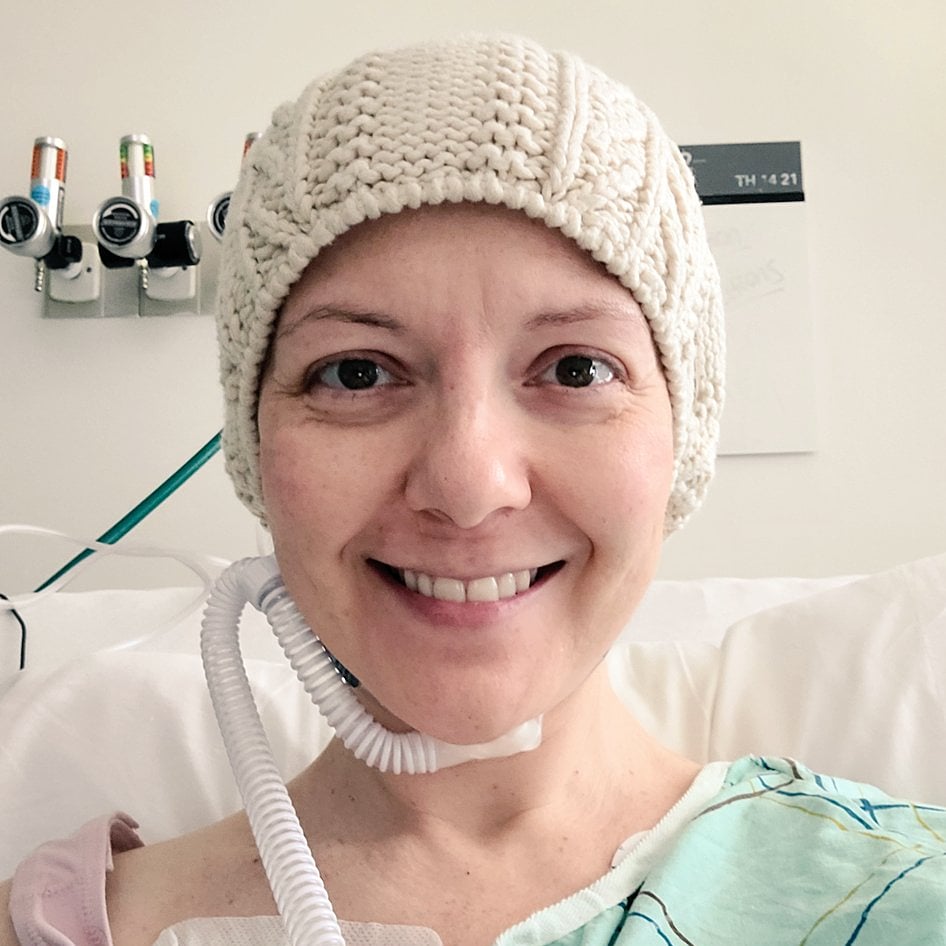
Call to Action
To survive this without losing my mind, I have to storyboard this entire sequence of events on paper. I need to get creative to find some writing resources. My food tray arrives, and it’s lined with a paper doily. A perfect blank canvas! I carefully slip it out from under my various plates, smiling that I’ll get one of these with every meal.
After breakfast, my nurses get me up for a walk. I keep my eyes peeled for something to write with as I slowly trudge through the halls, wheeling my oxygen tank behind me while my nurses keep a watchful eye on my pulse and oxygen levels. On a random computer station in the hallway, I spy a pen. It’s practically gleaming at me as I try to contain my excitement. I snag it and quickly tuck it into the pocket of my hospital gown.
I feel like a victorious rebel who’s found a secret weapon to defeat her nemesis.
That afternoon, I outline my next work in progress on the doilies, based loosely on my experiences with a touch of magic and kismet thrown in. Talk about a f*ck it script.
When we’re on the brink of losing it all, we find out who we really are and what we’re made of.
In that hospital, I rededicated myself to storytelling. I never imagined I’d find my most authentic voice while fighting to breathe but that’s the chanciness of life. I’m taking every chance I can find.
Because of the severity of my reaction, the doctors thought I’d be in the hospital for two weeks. Three days after being wheeled into the ER on a gurney, I walk out the front door of the hospital on my own two feet without oxygen, holding a bag full of meds, my prized doilies, and a pulse oximeter.
As I make my way to my waiting Uber ride gifted to me by my friend, Ashley, I look up at the night sky, smiling. Little did I know this wasn’t the resolution and denouement of the plot. The rising action had barely begun.
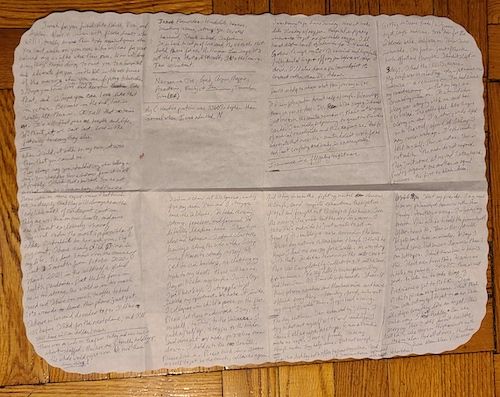
The Setback
At home, I begin to step down off the steroids on a typical schedule of 10 mg per week. During the second week, I get my first COVID vaccine shot with the approval of my pulmonologist. I feel some side effects, mostly fatigue, and chalk it up to the vaccine. My hacking cough never fades, and in the second week starts to get worse.
At night, I have classic mental health side effects that come with steroids. I can’t sleep for four nights even though I’m exhausted. I’m catatonic, staring into the void, afraid that if I go to sleep I may never wake up. My mind is not my own. The demons arrive with a vengeance putting the worst of thoughts into my head, and I fight them off with every mental health tool I have. The walls feel like they’re closing in on me.
This is not me. This is not reality. It’s the medication.
The meds don’t respond to my protest. They just stare at me, and I stare back. We push against one another in equal measure. The first to blink loses.
During the day, I try to distract myself with television, reading, texting friends because my cough makes it difficult to talk, and hugging my dog. Grace and Frankie makes me laugh. I cancel all my work meetings. I text Ashley and Edith. They offer to come stay the night with me. I don’t want to put them out. I ask if I can just have them on speed dial. “Of course,” they say without hesitation.
My radiation oncologist calls me to talk about my radiation therapy schedule that will start after chemotherapy. She notices I’m coughing a lot, and I tell her about all of the side effects I’ve been experiencing. I tell her that if I could just stop coughing, I think I could get some sleep. She prescribes a few medications and sends them to my closest pharmacy two blocks away. It closes in an hour. I need those medications if I have any hope of any sleep, and I desperately need sleep.
I rally to walk the two blocks and bring Phineas for support and comfort. Halfway in, I’m in trouble. Putting one foot in front of the other takes more effort than I thought it would. I struggle to get to the Walgreens, its glowing sign seems like a mile away instead of just a block.
I get inside, make my way to the back of the store, and there’s mercifully a chair for me to sit in while I wait. I thank the pharmacist when he hands me my meds and leave the store hoping and praying for relief as Phineas guides me back home. I have to stop every few steps to steady myself, bracing my body against the buildings we pass while clutching my bag of meds to my chest. My thoughts are jumbled and my head is throbbing.
I should call someone. I should go to the ER. I should stop overreacting. I should just get home and lie down. I can’t think clearly. It’s the meds. It’s just the meds.
Phineas and I make it inside the apartment. I collapse into child’s pose on the floor.
“These meds will save me,” I say out loud to myself, to Phineas, to the Universe. “They’ll calm my cough. I will sleep. I will be okay.”
I pull myself up, stagger to the kitchen, and dose out my meds, guzzling them down with a mason jar of water that I hold in a shaky hand. I hold onto the kitchen counter for support.
Please kick in. Please kick in.
I drag myself to the couch and collapse again. The night is fitful, but I manage to sleep a few hours, which is a relief. I take it as a sign of progress. In the morning, I’m weak but the day is warm. Phineas does his business at the curb and then we’re both just content to sit in the sun and let it sink into our bones. My neighbors pass by and ask how I am. All I can do is be honest. I have all their phone numbers, and they have mine. They have offered to do anything I need—drop off food, do my laundry, go to the grocery store, and walk Phineas.
They’re kind and caring, and I’m grateful.
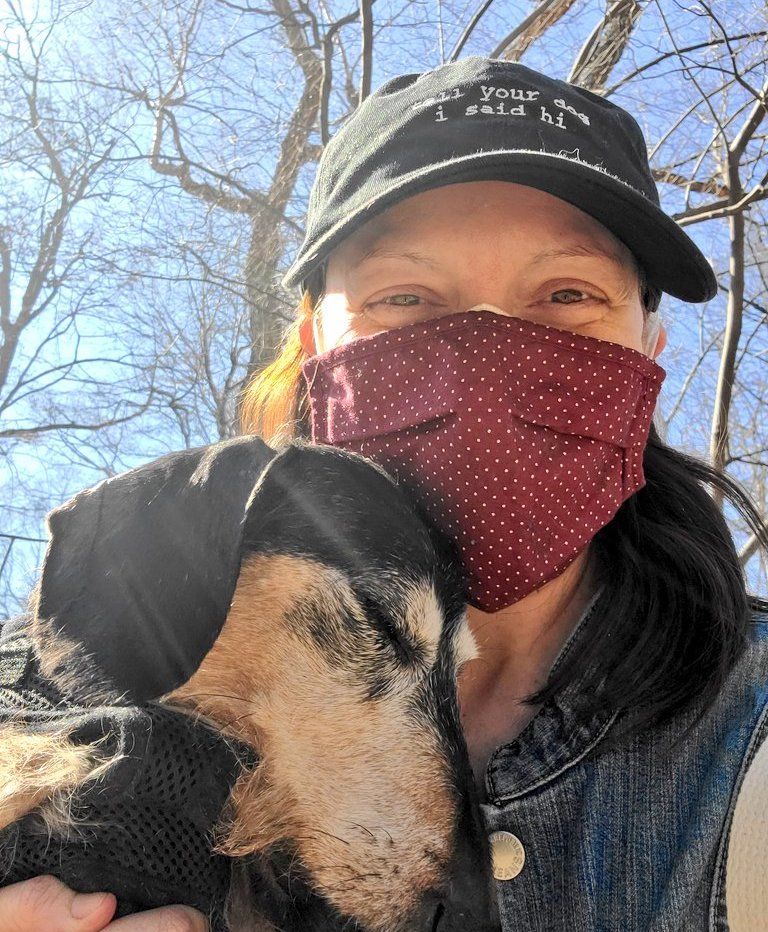
The glass house I’ve been holding up comes crashing down that night. I can’t walk, but I’m remarkably (foolishly?) calm. I text my friend, Vicki, and tell her I may need to go to the hospital tomorrow if I’m not better in the morning.
“Why don’t you call the after-hours number of your pulmonologist now?” she texts back.
She’s wise. I listen and call. My pulmonologist calls me back within 10 minutes.
I explain that I feel weak, and it’s difficult to take a deep breath.
“Get your pulse oximeter and take some deep breaths while I’m on the phone with you,” he says. “You’re very stoic. I sense you’re in worse shape than you’re telling me.”
I don’t know how he knows this. This is not the first time a doctor has called me stoic on this cancer journey. My breast surgeon said the same thing to me right before my mastectomy, when I was also calm. I’ve never thought of myself as a stoic person, but in the eye of the storm, I’m an expert at compartmentalizing my fear so I can do what needs to be done. I process later.
Is that what it means to be stoic?
I follow my pulmonologist’s instructions and take my pulse ox. It’s at 85, the same as when I went to the ER last time. I wasn’t panicking about my condition until that moment with my pulmonologist.
“Listen very carefully to me,” he says. “Take 60 mg of the prednisone and get to the ER.”
“Okay. I’m going to call 9-1-1.”
“Any chance you have a friend with a car who can take you? 9-1-1 is an option, but it can take a while for them to get to you, given the times we’re in.”
I have friends with cars. He calls the hospital to tell them I’m on my way.
I call Vicki. She can drive me. I call Ashley. She can pick up Phin. They’re on their way. I call Edith, tell her what’s happening, and she stays on the phone with me to keep me calm. The dream team is assembled and activated.
Vicki arrives first. The buzzer on the front door of my building doesn’t work, so I’ve got one option—I have to use the last bit of strength in my legs to get to the front door and let her in. Thankfully, I’m on the ground floor. I will myself to do it. She sees me through the glass of the building’s front door, and I see the panic in her eyes. I let her in, and immediately grab her arm so I don’t fall. She helps me back inside and begins to gather my things. Ashley arrives, and Vicki lets her in.
Vicki goes to pull her car up in front of my building and Ashley waits with me as she gathers Phin’s things that he’ll need to stay with her. I apologize profusely for putting them through this. Ashley stops me.
“Are you kidding me?” she says. “It’s an honor to be able to help. There’s so little we can do for you in all this. Let us do this and stop apologizing.”
Vicki is outside in her car waiting for me.
“Alright, we’re ready,” Ashley says as she grabs my bag.
“Ash, I can’t get up,” I say, my voice cracking as I sit on my couch motionless. My legs won’t work.
In an act of true heroism, Ashley grabs me around the waist and bears most of my weight out of the apartment. I barely feel my feet hit the floor. I will never forget the strength of her body braced against mine.
“I’ve got you,” she keeps repeating to me.
And I know she does. In that moment, I’m safe. I know I have to do everything possible to get through this because this group of friends is doing everything possible to help me.
I can’t let them down.
Ashley’s strength and support gets me to the car, and she passes me to Vicki who puts me in the backseat. I look back at Ashley and Phineas. I roll down the window to hang my head out like Phineas would do if he were with me. I’m fighting to get any amount of breath into my lungs as I beg the prednisone to kick in.
Vicki keeps one eye on the road and one on me in her rearview mirror. Later, Vicki would tell me that her heart was torn between wanting to drive like a maniac and getting me safely to the ER.
I watch the city whip by, west to east, north to south. My mind is blank. We get to the FDR Highway, and it’s clogged. I don't want this hideous tangle of highway to be my last view of this world. I’m trying desperately not to worry Vicki. I can’t die in the backseat of her car. That wouldn’t be fair to her. I try to smile at her in her rearview mirror as I say two small silent prayers: “Don’t close your eyes” and “Hold on.”
I know if I close my eyes, I could just slip away. Death and I are face to face, staring at each other again, two formidable gladiators in the arena. The first to blink loses. I use my fingers to force my eyelids to stay open.
I’ll do whatever it takes to win.
We get to the ER. Vicki hops out of her car and grabs a wheelchair. I slide across the backseat with the last bit of strength I have in me now. She helps me plop into the wheelchair, and we zip inside.
“Can we help you?” the security guard asks.
“I can’t breathe,” I choke out.
The lobby is eerily and mercifully empty. Maybe I’m dreaming. Maybe I’m already gone. Maybe this is Heaven’s waiting room. I’ve crossed over, west to east, north to south.
We begin the admissions process and my only thought now is that if I code at least I’m in the ER where I have a chance of being revived. Maybe my pulmonologist has a point about me being stoic.
The registrar calls over the nurse on duty. She attaches a pulse oximeter to my finger. It reads 78—seven points worse than I was in my apartment.
"Oh, shit," says the nurse.
She grabs my wheelchair and speeds me inside. I keep forcing my eyes to stay open. Hang on. Hang on.
Though I can feel the breeze of the nurse's speed through the wispy remnants of my hair, everything seems to be happening in stop-motion. I only see it in snapshots loaded into an old-fashioned slide projector, complete with a “ca-chunga” sound between each one:
- We round the corner to the nurse's station.
- I'm lifted onto a bed.
- 4 liters of oxygen is immediately put into my nose.
- I'm undressed by a nurse, Gina, and put into a gown as half-a-dozen monitors are swiftly pasted to my torso.
- An EKG machine is wheeled in to check my heart.
- A chest x-ray machine is wheeled in to check for blood clots.
- Vicki sits at the end of my bed.
- I try to smile to reassure her.
- My smile still works, and Vicki smiles back at me.
- The impossibly handsome attending doctor introduces himself and has already reviewed my chart.
The slide projector comes to an abrupt halt.
"You were going in respiratory failure," says the doctor. "It looks like you stepped down from your steroids too quickly and the inflammation flared again. This was a close call. You did the right thing by coming in. We’re going to need to re-admit you."
I feel tears start to pool in my eyes, and I look at Vicki.
“It’s OK,” she says. “You’re going to be OK.”
“You are,” says Gina. “We’re going to take care of you.”
Gina steps away to get supplies to do a blood draw. Vicki’s face brightens.
“Christa, there’s pink in your cheeks,” she says as she points at my monitor.
My numbers have rebounded. My pulse ox is 95. My pulse rate is returning to normal from the 100s to the 90s to the 80s.
Within the hour, I can walk on my own, and I ask Gina if I can use the bathroom. While I’m in there, Vicki advocates for me to get something to calm my relentless cough so I can sleep. Gina, an angel in nurse scrubs, gets it done. I’m so grateful for her care that I just keep saying thank you over and over again.
There’s a couple in the next bay fighting with their nurse. Vicki and I widen our eyes and do our best to ignore them. We talk about the pandemic, the vaccine, the future of New York, gratitude, collective grief, and how to heal.
It’s a relief to talk about something other than my health, especially in these absurd circumstances in the ER.
Vicki stays with me until the wee hours of the morning. She doesn’t want to leave until she’s sure I’m stable. I assure her I am. I tear up thanking her because “thank you” feels so inadequate. Just like Ashley, she tells me what an honor it is to be able to help.
I’m grateful, but I still feel badly for what I’ve put her through.
Gina takes me to get a CT scan. When we get back to the ER, I ask if she can move me to a different bay to get away from that feuding couple that was next to me, and she does. Ironically, she takes me to the same bay I was in just three weeks before—#76. The medicine she gave me for my cough is also a sleep aid. Fully monitored, I let my eyes close, confident that I won’t slip away.
Gina comes by to check on me. I have no idea how much time has passed. Ironically, I’m hungry. Gina gets me a sandwich and juice boxes. They’re delicious. She tells me she’s been telling everyone in the ER about me.
“There’s a light in you,” she says. “A spark. In 11 years of nursing, you’re the best patient I’ve ever had. I wish we could just be friends so I can hug you when you officially kick cancer to the curb.”
A few tears roll down my cheeks and I give her a hug. Saint Gina. In Italian, her name means Queen. Of course it does. I say another two-word prayer before taking another bite of my sandwich and drinking my juice: “thank you.”
Before dawn, I’m admitted to the hospital. Same floor, same nurses, and most of the same doctors from two weeks earlier. My nurse, Joe, sees my name on the admission sheet even though he’s not assigned to me this time. He comes into my room.
“Girl,” he says. “What are you doing back here?”
We talk as if we’re old friends. After everything we’ve been through, we are. I get the same exceptional care from the incredible nurses and doctors, and never stop saying thank you.
My pulse oximeter makes my fingertip glow a bright red, and it reminds me of E.T. Like him, I’m just trying to get home.
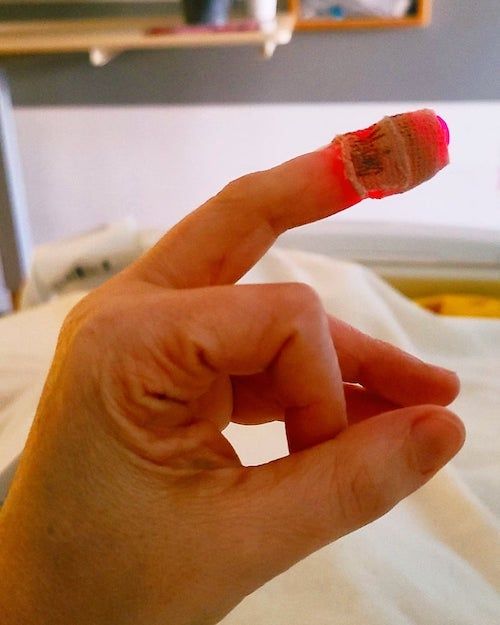
I take myself on walks, first with a walker to make sure I’m steady, then wheeling my oxygen behind me, and finally independently. I keep spreadsheets on my phone of my progress to show my doctors.
“Do you want a job here?” my pulmonologists joke with me.

Encouraged by my second rebound, I know that I have to take this time in the hospital to write down this chapter. I’ve been delaying this set of storyboards because I know how close I came to not being here at all. I don’t want to relive it, but the writer in me knows I have to get it all down.
The only way out is through.
I have a pen in my bag that Ashley packed, and the trusty meal-tray doilies serve me well again. I close my eyes and start to cry before I’ve even started. My hands shake as the ink from my pen flows and mixes with my tears.
Something in me churns as I write it all out in its raw, honest, and unedited form. Something that felt stuck is released and begins to run. The words flow so fast my hand muscles begin to ache and cramp, but the action can't be stopped. It runs straight through me into the pen. It feels like an out-of-body experience.
I’m watching myself set myself free by writing.
My nurse, Maggie, stops at the door with a look of concern on her face.
"Are you OK?" she asks.
I must look a mess with my watery eyes, runny nose, and shaking hands. I look up, almost startled to be back in my body again in a hospital bed.
"I'm just having a moment," I say. And that’s the truth.
“Can I bring you some tea?” she asks.
“That would be nice,” I smile.
And off she goes to get me something to bring me comfort, as all my nurses always do. Gratitude floods into my heart. Dozens of people in this hospital are dedicated to restoring my health.
They are characters in this narrative, too. I’m not alone in this, not by a long shot. This story has to be told to honor them. It’s a gift I have to give them. After all, they saved my life. Twice.
I owe them everything.

My radiation oncologist stops by to see me on my second night in the hospital.
“I couldn’t go home without putting my eyes on you,” she says. “You’re officially a case study!”
While I was being admitted to the hospital this time, my case was presented at the hospital’s oncology conference for clinicians and fellows because of its many unique features. Ah, to be special! I wish they had beamed me in for an Ask Me Anything session.
She informs me that because of my case, the C-reactive protein will now be measured for patients who receive Taxol. If their numbers begin to climb, doctors will be able to take action to mitigate the effects so other patients don’t go through what I went through these past few weeks.
Though these last few weeks were harrowing, I can find meaning in them if it helps others.
Several weeks later, I stop in to see my breast surgeon to say hello. Though the surgical part of my journey has been done for months, she’s been tracking my case and has been worried about me. She saved my life in October, and I want to put her mind at ease. She gives me a huge hug and tells me how much she loves me.
“Your case is a good reminder to us on this side of the desk,” she says. “Nothing in cancer care is benign. Every side effect tells us something, and as doctors we need to listen.”
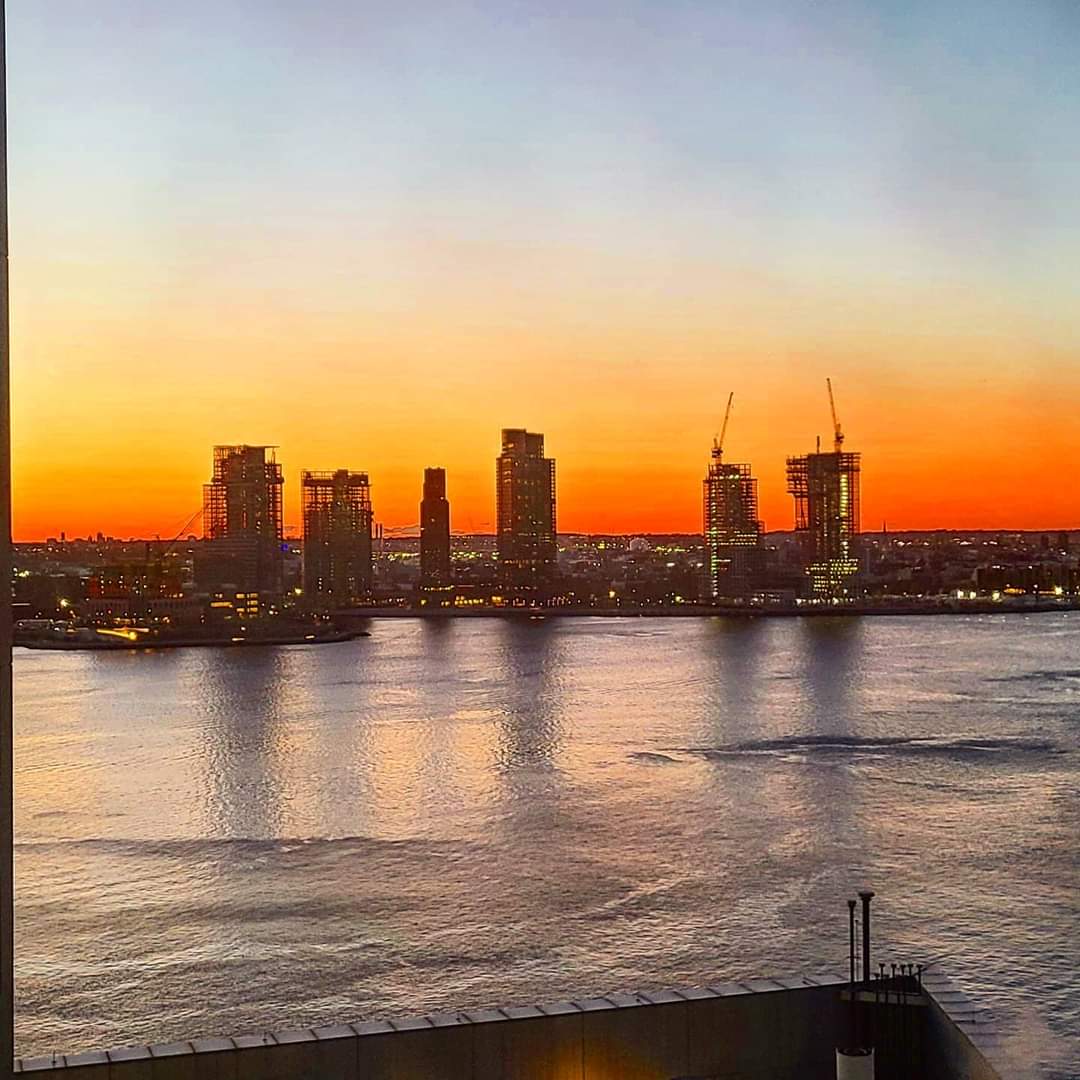
The Comeback
Healing, like writing, requires us to go up and over mountain after mountain when all we know is the next step, not the whole path. What saved my life were the friends who literally carried me to the ER, steroids, oxygen, doctors, and nurses.
What saved my spirit was writing.
If ever writer’s block or a lack of motivation to write finds me again, all I’ll need to do is think back on this time. I came perilously close to never being able to write again. I nearly died, twice, with too many stories left in me.
Could there be a more motivating reason than that?
My doctors and I are stepping me down from the steroids much more slowly this time around, and it’s working. My pulse ox numbers are holding strong. My cough is nearly gone. I’ve walked tens of thousands of steps and written tens of thousands of words in the past few weeks, grateful for every deep breath and every letter.
I’m not sure if my improved health is flowing from the writing or if my writing is flowing from my improved health. All I know is that both are on the up and up like never before.
I started joining Twitter’s #5amwritersclub and the #Pipelinewriters Friday night chats again. I’m grateful to be here, to write. I don’t even care if the writing is good. I’m just happy to be here to get it all down because I came so close to not being able to ever write another word.
Since returning home this second time, my writing is filled with more love than ever before. I owe a large part of that development to Vicki, Ashley, and Edith. I hope everyone has friends like these warrior women with fierce hearts who literally carried me when I couldn’t walk on my own, cared for your beloved dog as if he were their own, dropped everything to rush me into the hospital, and advocated for me when I was fighting to breathe.
I hope everyone knows life-saving love like that.
I hope we can all love like that in return, and I hope that kind of love finds its way into our writing much more often because, in the end, love is all there is. It’s all that sustains us. It’s all that gives us breath and life. Without it, we can’t last, and we can’t create. Love is the gateway to everything else.
I’ve been thinking a lot about regeneration, and how we promote healing within our bodies and our world. We revere resilience. We chase it. We covet it.
What no one tells us is that the price of grit is grief, and it’s steep.
We don’t know the true cost of it until we’re so far in that the only way out is through, and so we just have to keep going. There’s no refund or return policy. All we can do is pay, over and over again, and wait for it to build.
Having crossed this chasm into extreme resilience, I can confirm that the journey is absolutely worth it because the prize is that we get to live another day. Breathe another day. Write and create another day.
There is power in pain when we direct it with purpose. Writing can be that tool of direction. It certainly is for me. Our writing frees us. It gives us a place to pour our grief so we don’t have to carry it alone. We can't erase the challenges we've faced.
What we can do through story is memorialize them and make them mean something. When we put our writing out into the world it then has a chance to free, inspire, and empower someone else.
We’re all doing our best to live through this space of no longer and not yet.
So, if you’re going through a rough time right now—and who isn’t?—just know you aren’t alone. I’m right here with you, and will continue to be as long as I have breath in me. We’ll write our way out, together.
Our capacity is boundless.
Read Christa's Emerson Page series.
*Feature Image: Christa Avampato / created for Pipeline Artists by Graham Sisk